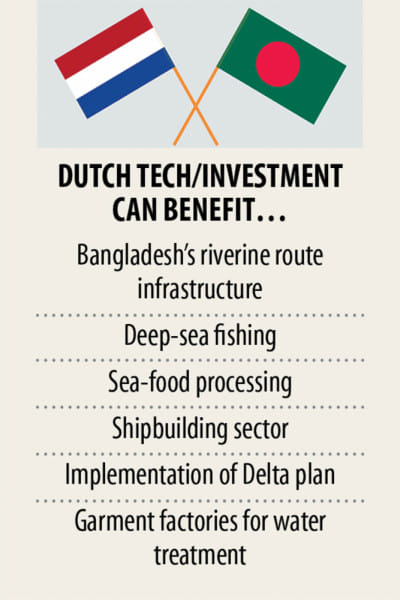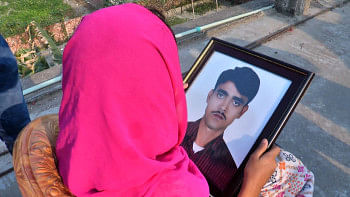Use Dutch expertise in deep-sea fishing, shipbuilding

Bangladesh can tap its potential for deep-sea fishing, better riverine routes and shipbuilding through collaborations with the Netherlands, speakers told a webinar yesterday.
"We have fishing experience out up to only 60 kilometres into the sea while there is scope to fish around 600 kilometres out in the deep sea," said Md Khurshed Alam, secretary (maritime affairs) to the foreign affairs ministry.
"We can utilise the potentiality of fishing through collaborations with the Netherlands," he said, pointing out the country's high potential in exporting deep sea fish caught in the Bay of Bengal.
Alam was addressing a session on water and maritime on the closing day of the "Bangladesh–Netherlands Investment Summit 2020", organised by the Bangladesh embassy in the northwest European country with support from the Dutch government.
The Netherland has experience in catching fish in the deep sea which could be utilised by Bangladesh for export and domestic consumption, he said. He also said there was even a good scope to utilise the experience and technology support of the Netherlands in processing sea food.
The Dutch experience in offshore aquaculture could also provide opportunities, he noted. According to him, Bangladesh has to spend around $8 billion per year for carrying goods on feeder vessels out to mother vessels and this money could be saved through the establishment of a deep-sea port with the aid of technology from the Netherlands.
Addressing the programme, Dutch Ambassador to Bangladesh Harry Verweij said their companies had the scope to make joint investments with Bangladeshi ones.
He recommended enabling more flexibility to develop the business environment in Bangladesh.
Verweij also expressed his interest in supporting Bangladesh to tap into its potentials of the water and maritime economy.
M Riaz Hamidullah, Bangladesh ambassador to The Netherlands, said the technology and innovative solutions of Dutch companies could tap into the economic possibilities of riverine routes and develop the infrastructure of river ports which was environmentally friendly and a cheaper mode of transport.
He also saw good potential in growing the shipbuilding industry with the help of Dutch companies.
Even Dutch and Bangladeshi companies can go for joint ventures in deep sea fishing which is still untapped, he said.
Saiful Islam, chairman of Western Marine Shipyard, said the Dutch companies could come to invest in joint ventures into Bangladesh's experience in building different kinds of ships, including sea bound trawlers and big ships.
He also saw a great opportunity in utilising waterways in Bangladesh to reduce logistical costs of business.
Zahedul Amin, co-founder and director of LightCastle Partners, in a presentation said dredging by the government was likely to increase the length of round-the-year navigable river waterways from the current 6,000 to 7,000 kilometres.
Inland riverine transportation can outpace road and rail transportation across Bangladesh and develop competitive, efficient supply chains attractive to businesses, he noted.
"Our traditional boats and vessels run on single stroke diesel engines. Netherlands have long since switched to LNG engines. Conversion of engines and making vessels spill-proof is a huge opportunity," he said.
He also said the private sector of Bangladesh has few vessels and lacks the knowledge and technology for deep sea fishing.
Bangladesh Delta Plan, which would take nearly $37 billion to implement, has good scopes for partnerships in physical infrastructure development, he said.
Moderated by Mattias Brienen, director of Larive International, the webinar was also addressed by Albert Hoek, an exclusive senior consultant of Broekman Logistic and Win Rietman, area sales manager of Nijhuis Industries.

 For all latest news, follow The Daily Star's Google News channel.
For all latest news, follow The Daily Star's Google News channel. 



Comments